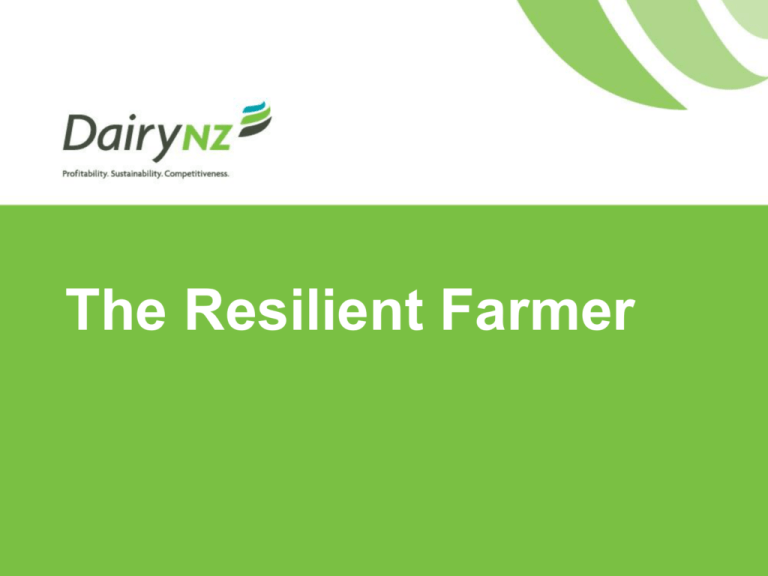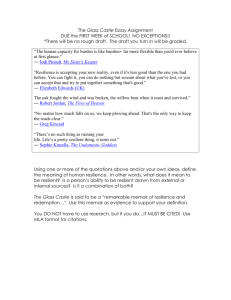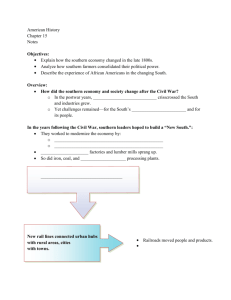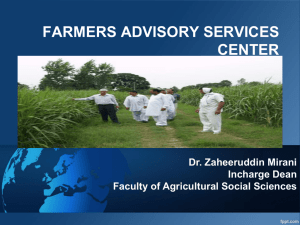The Resilient Farmer
advertisement

The Resilient Farmer Farmers focus on the health of their land machinery stock But the fourth leg to a successful dairy business is the wellbeing of farmers and farm workers The pressures of farming are not small… • • • • • • • • • • • Nutrient Limitations Water Limitations Health & Safety regulations Volatile milk price Volatile weather Intense workload High debt levels High staff turnover Isolation Negative public perceptions Farming in a fishbowl Therefore, we must be RESILIENT Definition of Resilience Resilience is often described as a personal quality that predisposes individuals to bounce back in the face of challenge or loss. Resilient leaders, however, do more than bounce back—they bounce forward. Resilience means… • • • • • • Understanding change and constantly learning Budgeting well when cash flow is good Knowing all critical indicators Spending time on only what’s important Celebrating wins Regularly cultivating networks Where do we get the strength to do this? We keep ourselves well - Resilient leaders make time for activities that revitalise them - Physically Emotionally Spiritually Intellectually - Personal renewal generates the energy needed to be sharp in the face of challenges and change. World Health Organisation Definition of WELLNESS A state of well-being in which the individual realises his or her own abilities, copes with the normal stresses of life, works productively and fruitfully and makes a contribution to his or her community Wellness is directly related to stress • Good Stress (Eustress): Fosters challenge and motivation • Excessive Stress: Mostly creates negative feelings • Burnout: Emotional, mental, and physical exhaustion caused by prolonged excessive stress. • Mental Illness: Disorganisation of the mind, and emotions so that normal functioning is impaired. • Suicidal: The lack of will to live Prolonged stress causes… • • • • • • • • • High blood pressure Depression Anxiety Heart Disease A weakened immune system Body aches and joint weakness Inability to concentrate or complete tasks Inability to make decisions Inability to stick to a plan Let’s look at what we’re seeing with farmers… Findings- Phase One- 2011-2013 1. DairyNZ Health Pitstop Data • • • • • 14% farmers reported high/very high total burnt out scores 32% reported pain that interfered with their work (backs, knees, shoulders) 57% male farmers have high blood pressure 41% all farmers have high cholesterol (referred to GP) Disease (cancer, cardiovascular, diabetes, respiratory) all highest for rural populations 2. Suicide Statistics (Walker, 2012; Tipples and Greenhalgh, 2012) • • • • 25 rural deaths per year (19.5/100000, 50% higher than urban population) Estimated 20-180 attempted suicides/yr No. 2 behind motor vehicle related deaths, twice that of farm vehicle deaths Peaks in spring (August) and Autumn (Feb-May) Farmer Survey (Nielson 2014) • Farmers are 31% more concerned about the impact of stress on their health than the general population • 23% more farmers compared to the general population worry about work all the time • 67% more farmers compared to the general population agree that “life is a constant struggle”… 67% more! Farmer Leaders’ Thoughts (collected at Dairy Environment Leader’s Forum 9/12/2014) As a group, they saw the toughest pressures as… 1. 2. 3. 4. Workload Financial Regulations/Limitations Outside Perception What did they think were driving these? 1. 2. 3. 4. Workload- Lack of investment into people and time management Financial- Making ill informed decisions/unaware of the skills needed to run a farm business successfully Regulations/Limitations- Government/law/corporate responsibility Outside Perception- Media Wrap up the situation • • • • • • Too much stress can cause mental illness We/farmers have more than a normal amount of stress This stress can be good and help us to thrive IF we are resilient We/farmers are concerned about our stress levels We are presenting with mental and physical illnesses The high pressures of farming are not going to go away What is the solution? Wellbeing/Resilience can be improved Lyubomirsky, Sonja; Sheldon, Kennon M.; Schkade, David (2005) Pursuing happiness: The architecture of sustainable change. Review of General Psychology, Vol 9(2), 111-131 50% Genetics 10% What happens to you 40% how you choose to deal with it Wellness takes TIME “He who does not make time for wellness will eventually be forced to take time for illness.” Illness in the “working” world= Burnout Burnout=The experience of long-term exhaustion and diminished interest due to the difficulty of managing multiple responsibilities. Often leads to cynicism and eventually to physical and mental breakdown. The Burnout Scale 1- Thriving- Surrounded by successes, alert, active, positive, excited about possibilities, rarely sick, no need for coffee or alcohol. 2- Achieving- On top of things and motivated but tired and/or forgetful, get the flu a few times a year, need pick me ups a few times a week. 3. Surviving- Managing most things but dropping a few balls, often disinterested, irritable, and rely on caffeine and or alcohol daily. 4. Burning Out- Not keeping up with responsibilities, overwhelmed, lacking confidence, belligerent, relationships failing, sick a lot. 5. Burnt Out- Have lost mobility and/or grip on reality Here is what works … (aligned with MHF principles based on UK Foresight project) When you know something is wrong… If you think someone is on their way to burnout or depression… • • • • • • Be on their side- let them talk! Show understanding and sympathy Don’t judge them Avoid offering advice Avoid making comparisons Don’t try to minimise their pain or act like it’s not a big deal If you are worried someone may already be depressed… • • Encourage them to speak to their health practitioner Encourage them to talk to someone about it. These numbers are good… •Rural Support Trust 0800 787 254 •Depression helpline 0800 111 757 If you are worried someone is suicidal… • • Get professional help. Do everything in your power to get a suicidal person the help he or she needs. Call a crisis line for advice and referrals. Encourage the person to see a mental health professional, help locate a treatment facility, or take them to a doctor's appointment. These are the numbers to call… •Samaritans 0800 726 666 •Lifeline 0800 543 354 Key Messages • • • • Farming is stressful and these stresses aren’t going away Therefore we must learn to be resilient and sharp This means we must keep ourselves well To keep well we must… – – – – – Be safe and have a plan Rest and Take Notice Be Active and Eat Well Keep Learning Connect and Give • We also need to help each other stay well by being aware and helping when needed







